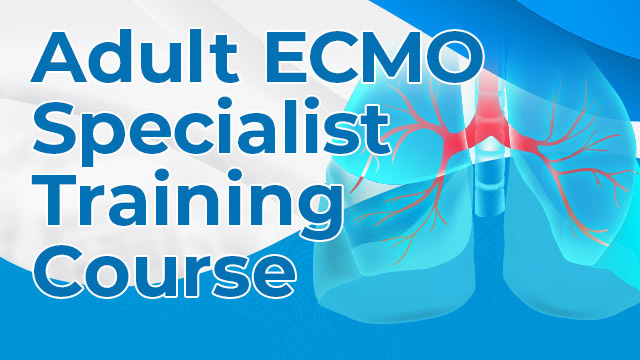Upcoming Classes

Adult ECMO Specialist Training Course – Overview
The Adult ECMO Specialist course is designed to teach the provider wishing to learn Adult V-A and V-V ECMO. The course has two options. Option one is the Full Course which includes two days of live, online didactic learning, and two days of in-person simulation. The didactic portion is fully interactive and limited to 16 learners. After successful completion of the full course, learners receive their full CEU/CME/CE credits and a certificate of successful completion of the Adult ECMO Specialist Course.
The didactic-only course is live and interactive via our private youtube channel. Learners are required to perform a roll call each day and ask four questions each day to verify participation. After completion of the course, validation of attendance, and completion of the course evaluation, learners receive their CEU/CE credit.
The didactic-only course cannot be used for a future full program.
Full Program
The “Full Program” is designed to prepare the learner for the ELSO Adult ECMO Certification Exam. Following completion of the course, it is the learner’s responsibility to ensure they have sufficient bedside ECMO monitoring hours for eligibility to sit for the ELSO Adult ECMO Specialist exam. The “Full Program” is limited to 16 participants. Participants are required to be present and visible, via the participants’ webcam through Zoom. Learners are required to participate in post-lecture discussions.
Full Program participants must sign up and attend both sections (didactic and simulation) at the scheduled time. Participants are required to actively participate and pass a written post-program exam to be eligible to receive a certificate of course completion. The passing score is 80%. The exam is given at the end of the simulation sessions and will cover the didactic and simulation sections.
It is required to attend the simulation portion of the course that is associated with the didactic portion when you register. Date substitutions are not permitted. “Please see schedule for details”.
Once 16 participants have registered, the course will be closed. You may add your email to our waitlist to be first in line for notification of our next scheduled course. Please see “this link” for the current number of open positions available.
Refund policy: No refunds will be processed except for verified emergencies and will be at the discretion of the course organizers.
ACCREDITATIONS (Full Program)
This course has been approved for 33 CE nursing credits This nursing continuing professional development activity was approved by the Northeast Multistate Division Education Unit, an accredited approver by the American Nurses Credentialing Center’s Commission on Accreditation.
This program is approved for future acceditations pending.
This nursing continuing professional development activity was approved by the Northeast Multistate Division Education Unit, an accredited approver by the American Nurses Credentialing Center’s Commission on Accreditation.
Didactic Only
The “Didactic Only Program” is designed for those exposed to or working with ECMO patients who wish to gain a greater understanding of ECMO circuitry, physiology, patient selection, cannulation strategies, ECMO type selection, and pharmacokinetics. The “Didactic Only” program is not limited to the number of participants. Participants will be sent a private link and password to view the program via a web browser. Participants are required to ask at least four questions per day, two questions for the morning and two questions for the afternoon sessions. Your questions are used to verify attendance and engagement, however, your specific questions may not be answered in real-time. Failure to do so will result in a reduction of credits awarded.
ACCREDITATIONS (Didactic)
This course has been approved for 17 CE nursing credits This nursing continuing professional development activity was approved by the Northeast Multistate Division Education Unit, an accredited approver by the American Nurses Credentialing Center’s Commission on Accreditation.
This program is approved for future acceditations pending.
How To View Didactic Sessions
For those enrolled in the “Full Course,” you will receive a Zoom link to the email associated with your registration.
You must also have the following:
-
- Stable/Dependable internet connection.
- Webcam.
- Speakers and microphone. (Headsets preferred).
- Good lighting and an un-distracting background.
During the program, you will see the slides, speaker, and moderator, and the speaker and moderator will be able to see and interact with each learner.
You are automatically enrolled in the simulation session part of the course that is associated with the dates for your didactic session. This information can be found in your registration confirmation email.
For those enrolled in the “Didactic Only” program, you will be sent a private link and password to view the program via a web browser, to the email associated with your registration.
At the start of each of the four sessions, day 1 morning and afternoon and day 2 morning and afternoon, you will type your name in the live chat box. In addition, you are required to ask 2 questions in each of the 4 sessions. This data is compiled to verify attendance and engagement.
Agenda
Schedule and objectives for the Adult ECMO didactic and simulation sessions.
Didactic Day 1
| Objectives | Content | Time | ||
|---|---|---|---|---|
| Introductions | Introductions, course instructions, expectations, learning objectives/goals, review of schedule | 0800–0830 | ||
| Discussion of ECMO overview | Overview of ECMO, history of ECMO, current and future trends in application | 0830–0930 | ||
| Discussion on the ECMO circuit | Description of the ECMO circuit including all components, principles of design and cannulas | 0930–1030 | ||
| Explore cannulation techniques | Cannulation techniques, VV configurations, VA configurations, special configurations | 1030–1130 | ||
| Discussion of cardiac pathologies and ECMO | Cardiac pathologies that lead to ECMO, criteria for ECMO support, pre/post operative ECMO, contraindications | 1130–1230 | ||
| LUNCH | 1230–1300 | |||
| Review of gas exchange, O₂ supply vs demand | Physiology of native lung gas exchange, O₂ supply vs demand, gas exchange in membrane, determinants of function | 1300–1400 | ||
| Discussion of respiratory failure, ARDS | Respiratory failure overview, ARDS definition and Berlin criteria, VV ECMO criteria, goals of VV ECMO | 1400–1500 | ||
| Explore approaches to patient management on VV ECMO | Patient management on VV ECMO, sedation, mobility, resting ventilation, fluid management | 1500–1600 | ||
| Discuss circuit management in VV ECMO | Circuit management of VV ECMO, blood flow, gas flow, recirculation, weaning | 1600–1700 | ||
| Total 8 hours (Day 1) — 480 minutes | ||||
Didactic Day 2
| Objectives | Content | Time | ||
|---|---|---|---|---|
| Explore how to monitor circuit pressures | Circuit monitoring, circuit pressures and abnormalities, complete circuit check, temperature management | 0800–0900 | ||
| Discussion of anticoagulation on ECMO | Anticoagulation while on ECMO, heparin, DTI’s, monitoring, blood transfusions, complications | 0900–1000 | ||
| Discussion of effects of ECMO on medications | Pharmacokinetics, Medications while on ECMO, sequestration, dosing strategies, clearance | 1000–1100 | ||
| Discussion on initiating ECMO | Initiation of ECMO, priming, patient preparation, initial settings, procedures on ECMO | 1100–1200 | ||
| Exploration of circuit emergencies | Overview of circuit emergencies: air embolus, thrombus, limb ischemia, drainage insufficiency | 1200–1300 | ||
| LUNCH | 1300–1330 | |||
| Overview of VA ECMO management | VA ECMO management, native heart resting, monitoring, complications, circuit operation, weaning | 1330–1430 | ||
| Discussion on ECPR and transport | ECPR management, patient selection, team roles, cannulation techniques, post‑arrest care, ethical considerations, transportation on ECMO | 1430–1530 | ||
| Discussion on CRRT in‑line with ECMO | CRRT in‑line with ECMO circuit, management, incidence, pressure abnormalities, outcomes | 1530–1630 | ||
| Exploration of patient emergencies on ECMO | Patient emergencies on ECMO: bleeding/ICH, cardiac arrest, hemothorax, pneumothorax, pericardial effusion, coagulopathy | 1630–1730 | ||
| Total 9 hours (Day 2) — 540 minutes | ||||
Simulation Lab Day 1
| Objectives | Content | Time | ||
|---|---|---|---|---|
| Live simulation of drainage insufficiency | Active participant simulation scenario of drainage insufficiency | 0900–1100 | ||
| Live simulation scenario recirculation | Active participant simulation of recirculation scenario | 1100–1300 | ||
| LUNCH | 1300–1330 | |||
| Live simulation scenario thrombus | Active participant simulation of thrombus scenario | 1330–1500 | ||
| Live simulation scenario cardiac arrest | Active participant simulation of cardiac arrest scenario | 1500–1700 | ||
| Total 7.5 hours (Day 1) — 450 minutes | ||||
Simulation Lab Day 2
| Objectives | Content | Time | ||
|---|---|---|---|---|
| Live simulation of drainage air entrainment | Active participant simulation of air entrainment scenario | 0800–1000 | ||
| Live simulation scenario oxygenator failure | Active participant simulation of oxygenator failure scenario | 1000–1200 | ||
| LUNCH | 1200–1230 | |||
| Live simulation scenario pump failure | Active participant simulation of pump failure scenario | 1230–1400 | ||
| Live simulation scenario hypoxia | Active participant simulation of hypoxia on VA ECMO scenario | 1400–1600 | ||
| EXAM didactic/simulation | 1600–1730 | |||
| Total 7.5 hours (Day 2) — 450 minutes | ||||
Simulation Location and Hotel Options
Location for Simulation:
Memorial Hermann The Woodlands Medical Center
9250 Pinecroft Dr, The Woodlands, TX 77380
Magnolia Conference room, 3rd floor, South tower.
Enter Via the Main Entrance.
Hospital Location

Your Experience
Leave a testimonial about our Adult ECMO Specialist Training Course.
- How has this course helped you?
- Has it been an easy stress-free experience?
- We want to hear from you.
Planning Committee
Joseph Basha, CCP
Vickie Carlyle, RN-BSN, CCRN, E-AEC
Kimberlee Spurlin, MSN, APRN, AGACNP-BC
Faculty
Joseph Basha, CCP
Vickie Carlyle, RN-BSN, CCRN, E-AEC
Kimberlee Spurlin, MSN, APRN, AGACNP-BC
Micheal Brown, RN, CCP
Mark Mettauer, MD
Devinder Bhatia, MD
Lucus Duvall, MD
Minh Tran, RRT, CCP
Ann Guercio, CCP, LP, MBA
Erica Cordoba Henry, NP
Yeunju (Michelle) Lee, Pharm.D, BCCCP
Vivik Patel, MD
Heather M. Robinson, MSN, APRN, AG-ACNP-BC
Adult ECMO Specialist Community Page
Anyone that registers for the Adult ECMO Specialist course, “Full Course” or “Didactic Only” is automatically enrolled in the Adult ECMO Specialist Community. The “Community” is exclusive and open only to graduates of the Adult ECMO Specialist course, “Full Course” or “Didactic Only”.
Once you have completed registration, you will receive an email with your login information. You will be allowed to change your password but not your screen name.
The Community site is for the sharing of ideas, experiences, challenging cases and updates on the latest published data and best practices, as well as, notifications of upcoming courses.

